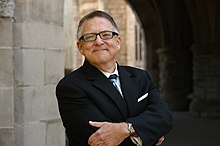Roger Ekirch
Arthur Roger Ekirch (born February 6, 1950 in Washington, DC ) is an American historian and sleep researcher . He is considered the discoverer of two-phase sleep , as it was common before the industrial revolution .
Life
Ekirch was born in Washington, DC in 1950. He received a bachelor's degree from Dartmouth College in 1972 and a master's degree from Johns Hopkins University in 1974 . There followed a doctorate in 1978. He has been a professor at Virginia Tech University since 1988 .
Ekirch is married with three children and lives on Sugarloaf Mountain in Roanoke County , Virginia.
Shared sleep theory
In 2001, Ekirch published a theory in a globally recognized article that is referred to in English as "segmented sleep" (German roughly: shared sleep). Accordingly, in the time before the industrial revolution, a pattern of behavior prevailed in the western world in which most people did not sleep in a continuous block of around eight hours a night, as is usual today. Instead, it was customary to divide the nightly sleep workload into two phases with an intermediate waking phase of around one to two hours. This pattern had been forgotten from the 18th century onwards in the course of the increasing spread of artificial light (gas lamps, later electricity). Ekirch's studies of hundreds of diaries, court texts, newspapers, and historical literature suggest that two-part sleep has been the norm for centuries. Recent research shows similar behavior in Africa and Asia.
The historian's theses are medically supported by the work of sleep researcher and neuropsychologist Thomas Wehr. Wehr withdrew artificial light from test subjects for a month. At first they slept through the night. After about three weeks, everyone's sleep behavior changed. They woke up around midnight and went back to sleep after being awake.
The pair of terms "first and second sleep" can be found in countless documents and novels from the late Middle Ages and early modern times. Cervantes lets his hero Don Quixote insult his interlocutor Sancho Panza because he slept through the night and did not wake up like everyone else after the "first sleep" to talk about world-shattering topics:
Don Quixote listened to nature in so far as he slept his first sleep; but he didn't allow himself the second - very different from Sancho, who never had a second because he always slept through to morning.
In his Simplicissimus, Grimmelshausen describes four men disguised as devils who frightened the protagonist after their “first sleep”, led them into the cellar and filled them with Spanish wine. The first and second sleep also occur in Homer , Tolstoy (первый сон), Balzac (premier sommeil) and Verga (prima sonno). In the middle of the 16th century, the French physician and philosopher Laurent Joubert advised married couples to use the time around midnight to witness children:
After the first sleep, they enjoy it more and achieve more.
Criticism came in 2015 from the Californian sleep researcher Jerry Siegel. Siegel examined three African tribes, which largely follow a pre-industrial daily routine and found in none of the suspected by Ekirch division of the night. Siegel suspects a connection with sleep rhythms and proximity to the equator, which Ekirch thinks he can refute.
Awards
- James L. Clifford Prize, American Society for Eighteenth-Century Studies, 2002
- Percy G. Adams Prize, Southeastern American Society for Eighteenth-Century Studies, 2002
literature
- Poor Carolina. Politics and Society in Colonial North Carolina, 1729-1776. University of North Carolina Press, Chapel Hill, NC 1981
- Bound for America: The Transportation of British Convicts to the Colonies, 1718-1775. Oxford University Press, New York 1987.
- At Day's Close: Night in Times Past. WW Norton, New York 2005.
Web links
- Roger Ekirch's résumé at Virginia Tech, including a list of publications
- Literature by and about Roger Ekirch in the bibliographic database WorldCat
- Short biography and reviews of works by Roger Ekirch at perlentaucher.de
Individual evidence
- ↑ Personal Information history.vt.edu, accessed April 26, 2014.
- ^ Sleep We Have Lost: Pre-industrial Slumber in the British Isles. In: American Historical Review. Volume CV, No. 2, April 2001, pp. 343-387.
- ↑ "Seminal": http://www.bbc.com/news/magazine-16964783 accessed on April 24, 2014.
- ↑ Thomas A. Wehr: In short photoperiods, human sleep is biphasic . In: Journal of Sleep Research . tape 1 , no. 2 , June 1, 1992, ISSN 1365-2869 , pp. 103-107 , doi : 10.1111 / j.1365-2869.1992.tb00019.x ( wiley.com [accessed August 31, 2017]).
- ↑ Gandhi Yetish, Hillard Kaplan, Michael Gurven, Brian Wood, Herman Pontzer: Natural Sleep and Its Seasonal Variations in Three Pre-industrial Societies . In: Current Biology . tape 25 , no. 21 , November 2, 2015, ISSN 0960-9822 , p. 2862–2868 , doi : 10.1016 / j.cub.2015.09.046 , PMID 26480842 ( cell.com [accessed August 31, 2017]).
| personal data | |
|---|---|
| SURNAME | Ekirch, Roger |
| ALTERNATIVE NAMES | Ekirch, Arthur Roger (full name) |
| BRIEF DESCRIPTION | American historian and sleep researcher |
| DATE OF BIRTH | February 6, 1950 |
| PLACE OF BIRTH | Washington, DC |
